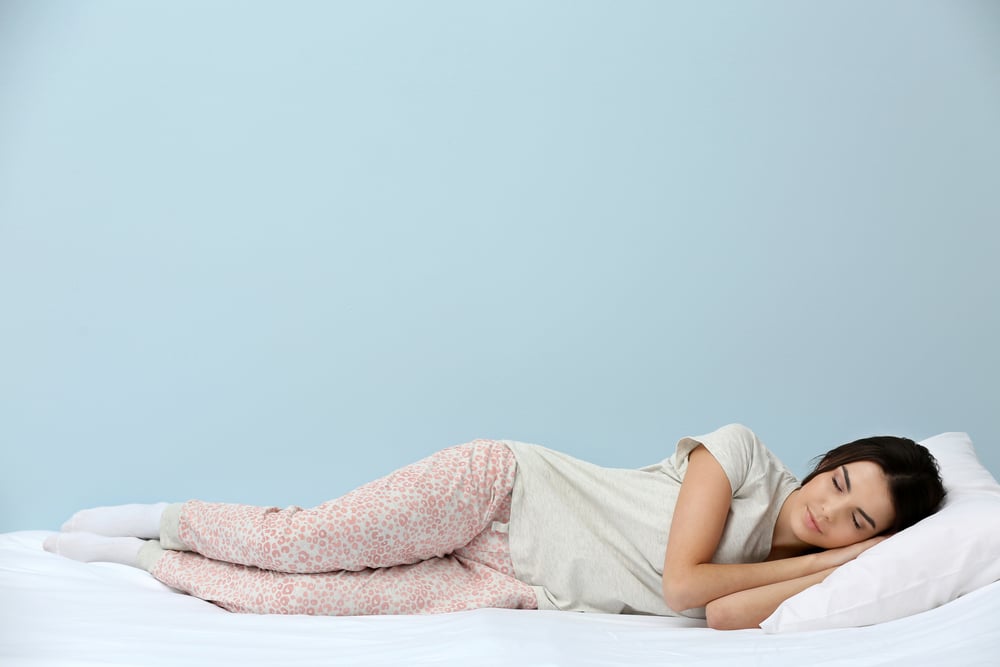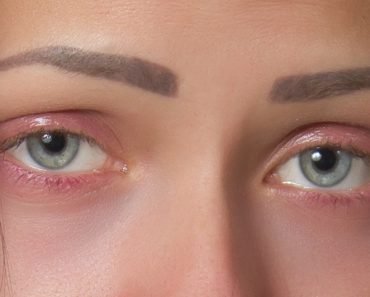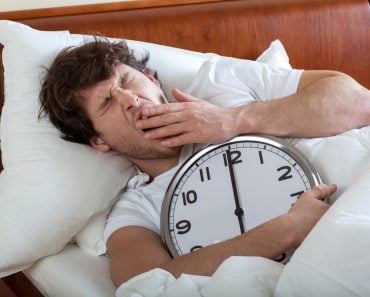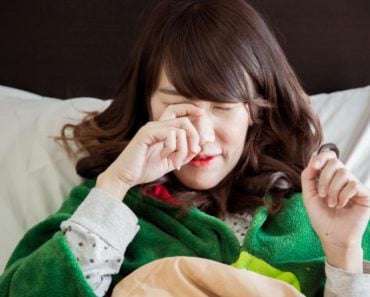Table of Contents (click to expand)
A combination of physiological changes that happen while we sleep, our chosen sleep position, and various environmental factors can all cause our faces to look puffy, discolored, textured or simply different in the mornings.
Imagine rolling out of bed following a long night after a busy week. You swing your legs to the floor and stumble to the bathroom to start the day. However, when you pry your eyes open and take a peek in the mirror, you may be surprised to find that your eyes are puffy, your skin is an unnatural color, and there are lines or wrinkles in your skin… basically, you don’t look like your normal healthy and happy self.
After splashing some cold water on your face, taking a drink of water and walking around for 10-15 minutes, your face will typically return to its neutral state, but why do we suffer from a “just woke up” face at all?

Recommended Video for you:
What Causes ‘Just Woke Up’ Face?
There are quite a few common causes that can lead to your face looking a bit less than normal upon waking up, including dehydration, gravity, sleep wrinkles, poor eating/lifestyle habits, and the quality/texture of your pillow, among others.
Gravity
The main complaint that most people have in the morning is that their skin often looks puffy or swollen, particularly around their eyes. This is extremely common, and while there are a number of potential causes, gravity is the main explanation. When we sleep on our backs, the fluids in our body can pool in certain areas, including the facial tissues, causing the space around our eyes to look swollen or puffy. When you stand up and begin moving around, the fluid balance in your body is reestablished, and the puffy eyes should disappear. This is especially true if your body is retaining water, which can occur in premenstrual women or people with a diet high in salt.
That being said, there are also a number of underlying health conditions that can cause puffiness of the face, including hypertension, pinky eye, or chronically dry eyes. If the puffiness doesn’t go away within an hour of waking up, you may want to speak with your doctor about possible causes.
Dehydration
If your skin looks dull, pale or dry in the morning, there is a good chance that you’re simply dehydrated. While we sleep, some of the moisture in our skin is absorbed by the pillowcase, or we might sweat out fluids during our slumber. If you aren’t drinking enough water, the signs will be extremely clear in the morning when you look in the mirror. Starting the day with a tall glass of water is one way to speed the recovery of your appearance, if your morning face is due to dehydration.

Diet And Lifestyle
There are many different lifestyle habits that can affect your appearance in the morning, including high alcohol consumption, cigarette smoking, irregular sleep habits, excess sun exposure and low activity levels. All of these choices can make it harder for your body to rest and repair at night, in addition to dehydrating the body, reducing circulation, and increasing cellular damage on the skin. In terms of diet, as mentioned above, oily and salty foods, highly processed food, junk food and fast food may all be delicious, but they aren’t good for skin health, and could contribute to your appearance in the morning.
Pillow Quality
The material and quality of your pillow can also have an effect on the appearance of your face. Loose pillow cases can bunch up into creases, which can then be pressed against your face, leaving streaks or lines of discoloration. These sleep wrinkles are very evident if you sleep on your hand, or with your face crunched into an unnatural angle. If your pillow is too firm or too large, it can cause differences in pressure against your face, which can leave your expression looking asymmetric come daylight. A memory foam pillow with a tight pillowcase can eliminate some of these issues. The symmetry should return within 20-30 minutes of waking up and moving around, while the sleep wrinkles and creases can be reduced by rehydrating and giving your face a vigorous wash in cold water.

Stress
It seems like stress affects every part of the body, and the way our face looks in the morning is no exception. Elevated stress hormones from chronic anxiety can make it more difficult to sleep, interfere with our metabolism, and elevate our risk for chronic disease and oxidative stress. Additionally, stress leads us to eat less healthy foods, drink alcohol and smoke cigarettes—habitual stress relievers. Stress is also linked to premature aging and reduced skin elasticity, meaning that our skin is slower to “bounce back” in the morning. Excess stress hormones will cause a drop in collagen and melanin production, neither of which is good for your look!
Allergies
Finally, allergies can play a big role in our appearance. For those who suffer from seasonal hay fever or allergies to pollen, ragweed, mold, etc., it can cause inflammation in the tissues surrounding the eyes and other soft tissues of the face. Taking anti-inflammatory medication or allergy pills can help relieve these symptoms. Pollution and environmental contaminants may also contribute to your “just woke up” face. Dust, soot, smoke, and unclean water can wreak havoc on the skin and leave you looking less than your best!

How To Prevent Just Woke Up Face
If you regularly struggle with “morning face”, particularly if the puffiness or wrinkles don’t fade relatively quickly, there are some other effective strategies to improve sleep quality and protect your mornings from “just woke up” face.
Hydrate – Staying hydrated is not only the best way to prevent “just woke up” face, but also to improve your face’s ability to bounce back and get back to normal after a long slumber. Drinking a glass of water before bed and then keeping water on a bedside table is a good way to never go thirsty in the middle of the night.
Elevate – Sleeping on a slightly more elevated pillow will prevent the pooling of fluid in the soft tissues around your eyes. While this may feel unusual at first, you may be shocked at the difference it makes on your morning face.
Moisturize – Keeping your skin moisturized with hyaluronic acid-containing scrubs or other natural moisturizers will hold fluid in your skin better throughout the night, leaving you looking more fresh by the time the alarm goes off.
Stop Smoking – For myriad reasons, you should quit smoking, particularly if you notice bags or puffiness under your eyes, or an unhealthy color to your skin. Poor circulation to the blood vessels of your face can be caused by habitual smoking, leaving you looking pale and drawn, even after a good night’s sleep.
Exercise – Being active is a great way to get the blood flowing, detox the body through sweat, and release feel-good neurotransmitters that can relieve stress. After waking up, try to do some jumping jacks, sit-ups or pushups to start the day; the rush of adrenaline and energy can shake the sluggishness off your face, and our of your mind!

A Final Word
No one wakes up from a relaxing slumber looking like a million bucks, but our bodies are normally quick to balance and return our face to its normal state. For people who suffer from long-lasting morning face, however, understanding the causes and applying some of these strategies might make all the difference in the world.
And don’t forget, even if you look a bit puffy or pale in the morning, you’re still beautiful!
References (click to expand)
- Diridollou, S., Traon, A. P.-L., Maillet, A., Bellossi, F., Black, D., Patat, F., … Gall, Y. (2000, August). Characterisation of gravity-induced facial skin oedema using biophysical measurement techniques. Skin Research and Technology. Wiley.
- Sundelin, T., Lekander, M., Sorjonen, K., & Axelsson, J. (2017, May). Negative effects of restricted sleep on facial appearance and social appeal. Royal Society Open Science. The Royal Society.
- Kim, M. A., Kim, E. J., Kang, B. Y., & Lee, H. K. (2017). The Effects of Sleep Deprivation on the Biophysical Properties of Facial Skin. Journal of Cosmetics, Dermatological Sciences and Applications. Scientific Research Publishing, Inc.













